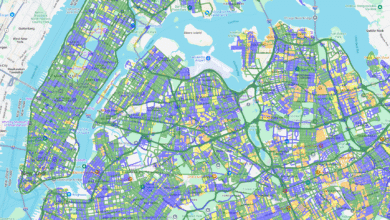

On any given day, there’s a decent chance you’ll be targeted by scammers. Maybe it’s a text about a fake unpaid toll notice, or an email about your Amazon account being hacked. And don’t even get us started on the phone calls! For the most part, these are easy enough to spot, but now and then, a shockingly convincing claim sneaks through that makes even the savviest among us scratch our heads. For example, several real estate scams in New York City are currently targeting innocent and unsuspecting renters and buyers. Ahead, hear about these scams firsthand and learn how you can protect yourself.
1. Payment requests before viewing a rental listing
According to a 2024 national survey from leasing automation company Rently, “In 2023 alone, the Federal Trade Commission showed more than 10,000 rental scam cases opened, and the Better Business Bureau reported a 45% increase in rental scam complaints over the past two years.”
“As more of the rental process moves online, scammers are finding new ways to exploit digital convenience,” Merrick Lackner, CEO at Rently, tells 6sqft. “The best defense starts with awareness. If a deal feels rushed, if communication seems inconsistent, or if someone asks for payment before a verified viewing, those are warning signs.”
That said, sometimes it can be all too easy to get caught off guard—especially if you’re rushing to find an apartment.
As shared in a Reddit post from earlier this year, a NYC apartment hunter received text messages from an “agent” claiming to work for a reputable brokerage and assuming the name of an actual broker there. The so-called agent then asked them to fill out a digital “application form” that included a “$150 application fee.”
However, according to the New York City Tenant Bill of Rights, “Landlords are not allowed to charge you more than $20 for an apartment application.” This fee covers a background and/or credit check. And this is collected after viewing an apartment, when a prospective renter decides to move forward with the application.
As of this past June, the Fairness in Apartment Rental Expenses (FARE) Act dictates that prospective tenants can not be asked to pay broker fees to real estate agents they did not hire. It also prohibits landlords and brokers from requiring tenants to work with a specific real estate agent.
The NYPD warns that scammers will often request illegal, nonrefundable payments via Western Union, MoneyGram, or Green Dot MoneyPak.
The police department also cautions that filling out applications with personal information can put you at risk for identity theft.
2. Real photos, too-good-to-be-true prices
The other major rental scam happening now (which often goes hand-in-hand with fake payment requests) is bad actors taking actual listing photos and creating fake listings with too-good-to-be-true prices.
“The biggest scams I see right now are mostly on social media, where unlicensed people pose as brokers offering rentals that don’t actually exist,” shares Kirsten Jordan, licensed associate real estate broker at Corcoran.
Ben Jacobs of the Chestler Jacobs Team at Douglas Elliman agrees: “Unfortunately, it’s easy for people to copy photos or create fake listings online to get someone’s attention.”
To their point, another Redditor shared screenshots from a fake TikTok account, in which a scammer took the name and photo of a well-respected NYC broker and filled their feed with listing photos of apartments renting for just $1,000 a month (unheard of pretty much anywhere in the city).
Those in the know would immediately realize that this actual broker sells multi-million-dollar condos, and, therefore, wouldn’t be renting any units. But for the average apartment seeker, it’s confusing. Case in point: The fake TikTok listing videos had gotten hundreds of thousands of views.
And it’s not just on social media that this is happening. A Pix11 news report from earlier this year shared the story of one NYC renter who spotted a scam listing on StreetEasy. (The company responded with a statement saying they have “comprehensive systems in place to prevent fraudulent listings and suspicious behavior, and to keep our user information safe.”)
Often, these scams target people looking to rent from afar. Or, the fake agent will claim they can’t get you into the actual unit for a tour because the current tenants are home, or the apartment is undergoing a renovation.
“If you’re renting sight unseen, always ask if there’s a waiver involved and be cautious. Virtual tours are helpful, but if possible, have someone you trust physically check the place,” Jordan advises, adding that this can happen with purchases, too.
She cautions that the real scam usually involves wire fraud: “Hackers trying to intercept funds during closings or deposits.”
“Sometimes it’s safer to use certified checks, which can be canceled if needed, unlike wire transfers, which once sent are basically gone,” Jordan recommends. “If you do wire funds, double-check wiring instructions directly with your attorney or title company by phone before sending anything.”
3. Zoom meeting links
Vickey Barron, a top broker with Compass, tells 6sqft that scams aren’t just affecting renters and buyers but agents, too.
“Recently, I’ve been receiving a number of odd text messages requesting to view some of my listings, often with misspelled words or incorrect information,” she shares. “I received a follow-up via email from someone claiming to be a direct buyer interested in viewing a property. He said he was ‘out of town’ and wanted to connect before seeing it in person. When I suggested a quick call, he pushed for a Zoom meeting instead, citing ‘connectivity issues.’”
“Then came the real red flag: he asked if I was using a Windows computer, insisting that his links ‘don’t work on MacBooks or phones,’” she continues.
“That unusual request immediately raised my suspicion; the supposed ‘Zoom link’ would likely have led to malware or a phishing site disguised as a legitimate meeting invitation,” Barron explains.
“Scammers often use strange technical excuses like this to trick people into clicking on malicious links or downloading harmful software designed to steal data or compromise systems.”
Of course, renters and buyers should also be wary if an “agent” deploys a similar tactic.
How to protect yourself from real estate scams:
The NYPD has six general scam-prevention tips for apartment hunters in New York City:
- Do not give an advance payment prior to viewing an available listing.
- Do not wire money or use a Green Dot Money Pak as a form of payment.
- Do not complete the application providing personal information prior to viewing the available listing.
- Research listing “Agent” and address online or through the Better Business Bureau.
- NEVER complete an application without actually seeing the apartment/premise.
- If an offer sounds too good to be true, it probably is.
In speaking with Pix11, Robert Swiderski, owner of Sunnyside, Queens-based RealTegrity, advised New Yorkers: “The only information I would share with somebody upfront is your name and your income information.” (The latter info being just a number, without any corresponding documentation.)
“Whether you are a broker, buyer, or renter, trust your gut, if something feels off, take a moment to pause and think it through. Keep control of the situation rather than letting it control you. A few seconds of caution can prevent a major cybersecurity issue. Your intuition is almost always correct!” concludes Barron.
Source link




